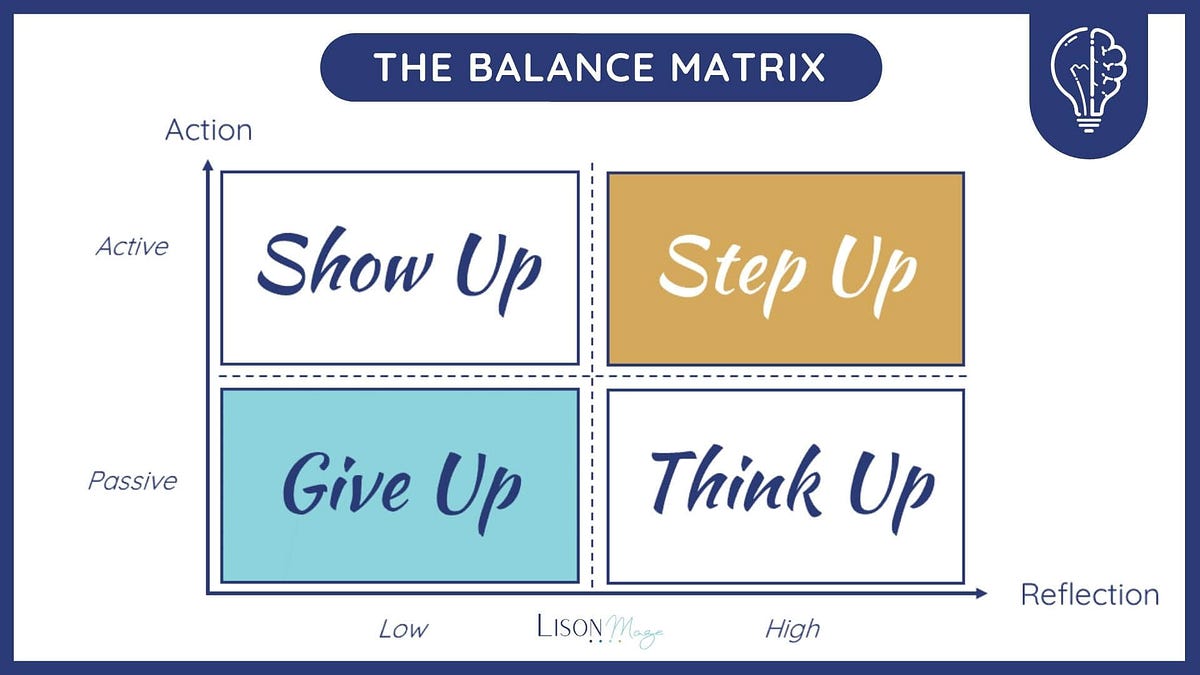I like the quote from Jana Kingsford: “Balance is not something you find, it’s something you create.”
It’s like biking. Finding balance in stillness is precarious, but it comes almost naturally as soon as we start pedalling. As such, balance is not truly practicable with a passive approach. We need to seek it actively. We need to create it.
Creating balance in life requires a mix of reflection and action. Each individual will need to find the correct dosage, which gives them a sustainable equilibrium, powering them through challenges and fostering their growth.
Indeed, the result from this inner exploration is different for each of us, but there is one immutable law that we all have to comply with.
We cannot find balance only with our reflections.
And overthinking is a toxic mental state that just tries to do that — finding a state of balance only with reflection and no action. When we constantly rehearse the same thoughts, again and again, we are hindering our ability to create balance.
According to a study published in Europe’s Journal of Psychology, overthinking decreases proactivity. It makes us passive. It suppresses our energy and our willingness to take action.
During my interviews for my book, participants often describe a situation in a meeting where they would think about what to say. But to be seen at their best, they would overthink how to say it, missing the moment when to say it.
They are on a station platform, thinking of the best way to get to their destination. The train arrives, but they are still in their thoughts. As the doors close and the operator whistles, they escape their mental loop to realise they missed their train.
The worst part of it is that overthinkers will keep reliving the event, again and again, in their minds, and every time they will blame themselves for missing the opportunity.
So, it is essential to balance our reflections and actions.

When there is an imbalance with too much action, we simply put on a show with nothing to back us. On the other hand, when we reflect too much, we simply dream.
We can become our true selves when we balance our reflections and actions. In this state, we can grow and blossom.
My Last Inspiration
In the movie The Secret Life of Walter Mitty, Ben Stiller plays the role of a day-dreamer, working as a photography manager in charge of negatives at a magazine called Life.
It is ironic to observe the striking contrast between the central theme advertised by the journal, showing Life in its grandeur, and Mitty’s life, which is profoundly boring.
When Walter faces an issue that requires him to speak up, like opening up to his attractive colleague and calling out the rude behaviour of his new director — he remains silent.
Like many, he is on the station platform overthinking how to get to his destination and does not realise he is missing the train.
And when the moment is gone, he escapes his reality by “zoning out”. He imagines himself overcoming incredible difficulties to make up for his previous silences. He jumps into a burning building to save his secret crush’s dog or confront his bullying boss in an epic fight that could have been taken out straight from a Marvel movie.
Without spoiling the story, the character is forced to get out of his comfort zone by external events. And then, his real self slowly catches up with his idealised self. As Walter Mitty is compelled to act, he steps up, literally living his “day-dreaming” episodes.
Although the movie is quite conventional, I love the message it conveys.
When we create balance, matching reflection and action, we can live up to and even exceed our expectations.
A New Challenge
Have you ever faced this situation where you are at a dinner or a party, and you tell a joke with a quiet voice, and it is like they didn’t hear you?
Nobody reacts.
Nobody except one person who picks up the joke and repeats it aloud. And suddenly, everybody starts laughing.
Instead of an evening gathering, it might have been in a meeting room, where you hear a colleague suggesting the idea you just told him an hour ago and getting credit for it.
If these situations happened to you, speak up.
The answer to “when is it the right time?” is: now — not later. Think before you act but act before you overthink, as this is how you can create balance.
I hope you enjoy this article. If you do, please share it! And once more, thank you for reading me.
With gratitude,
Lison
PS: My book Act Before You overThink is out. To buy it, use this link => https://lisonmage.com/act-before-you-overthink-buy/
Source:
[1]- Collins Jim, Good to Great: Why Some Companies Make the Leap and Others Don’t (HarperBusiness, 2001)
[2]- Taylor Adam, “After mopping up spilled coffee, Dutch leader Mark Ruttebecomes a symbol of etiquette”, The Washington Post (2018), accessed April 2022.
[3]- Erdbrink Thomas, “Playing by the Rules: Dutch Leader Offers a Sober Contrast in a Brash Era”, The New York Times (2020), accessed April 2022.
[4]- Stillman Jessica, “Humility Is an Undersung Leadership Skill. Adam Grant Says These 2 Interview Questions Screen for It”, Inc.com (2021), accessed April 2022.


Responses